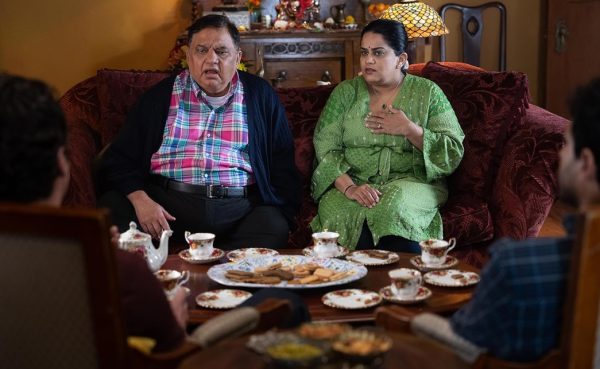A Nice Indian Boy, 2025.
Directed by Roshan Sethi.
Starring Karan Soni, Jonathan Groff, Sunita Mani, Zarna Garg, Harish Patel, Peter S. Kim, Sean Amsing, Sas Goldberg, Sachin Sahel, and Dhirendra.
SYNOPSIS:
When Naveen brings his fiancé Jay home to meet his traditional Indian family, they must contend with accepting his white-orphan-artist boyfriend and helping them plan the Indian wedding of their dreams.
Director Roshan Sethi’s breezy and wholesome A Nice Indian Boy (from a screenplay by Eric Randall, adapting Madhuri Shekar’s play) tells a love story between two Indians: Karan Soni’s Naveen Gavaskar and Jonathan Groff’s Jay Kurundkar. Yes, you read that correctly. Technically, Jay was adopted by Indian parents from a young age, but took in the culture and religion, practicing it with respect. Smartly, the film also isn’t concerned with whether or not this is cultural appropriation, but uses this and other dynamics in the Gavaskar to probe these traditions, how they have evolved, and what a more modern perspective looks like.
Working at the hospital, Naveen has a meet-cute with Jay on picture day, smitten with him from afar in the waiting room. Soon after, he encounters Jay praying at a nearby temple, which naturally confuses him until learning about his backstory following a date to see a retro showing of Bollywood’s Dilwale Dulhania Le Jayenge (referred to as an acronym), a childhood favorite of Jay that instills values he holds dear while depicting his dream wedding, which is most importantly an extravagant but tender celebration of family. While the date is for the most part going well, this does at odds with Naveen who struggles to come out to parents (Zarna Garg and Harish Patel) who already correctly assume he is gay, let alone have the confidence and courage to introduce Jay to the family and be assertive not just about his sexuality but the type of romance and marriage he wants in the face of traditionalist values that set his sister Arundhathi (Sunita Mani) up with an arranged one.
When it’s do-or-die, Naveen assures Jay that his parents are liberal for traditionalists, stating that they accept his sexuality. This is true to an extent, but the joke here is that he rattles off about 15 different modern things not to do, lest his parents potentially take issue. It’s an amusing look into his timidness, juxtaposed with the more laid-back Jay, not only in his casual behavior and sexuality but also regarding Indian traditions. Of course, Naveen mentions over the phone that Jay is a nice Indian boy, failing to mention the whiteness, which is also something his parents might oppose.
This is entirely familiar plotting that works on the strength of interrogating every aspect of this family, from whether or not the parents (or feel like they were ripped straight out of a sitcom with their loveless and indifferent nature) found a road to genuinely love each other following their arranged marriage, and whether or not such a relationship can still work in the modern day with Arundathi, who develops a bill of a bitterness toward Naveen, and understandably so, since she was pushed out of dating who she wanted and pressured into tradition. Six years later, the parents haven’t changed so much, but more or less given up that Naveen will never get married if they don’t let him be with Jay. There is also the question of whether or not Naveen and Jay’s relationship will survive, but this is a clichéd and formulaic story, so it’s not too much of a pressing matter.
While the chemistry between Karan Soni and Jonathan Groff is an instant spark and sweet, it’s essential to go back to that sitcom comparison. This is a funny movie, for the most part, but it comes with big-time sitcom energy, right down to the cinematography and lighting. The source material coming from a play might not help matters. Some colorful costumes and a vibrant, lovely dance number toward the end overcome this, but a cinematic feel is missing otherwise.
Still, A Nice Indian Boy nicely rides off that charm between the leads and its thematic, more extensive look into this family across multiple generations.
Flickering Myth Rating – Film: ★ ★ ★ / Movie: ★ ★ ★
Robert Kojder is a member of the Chicago Film Critics Association, Critics Choice Association, and Online Film Critics Society. He is also the Flickering Myth Reviews Editor. Check here for new reviews and follow my BlueSky or Letterboxd














